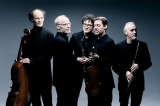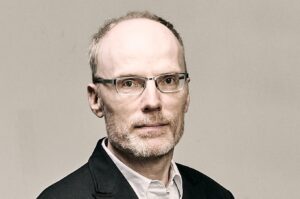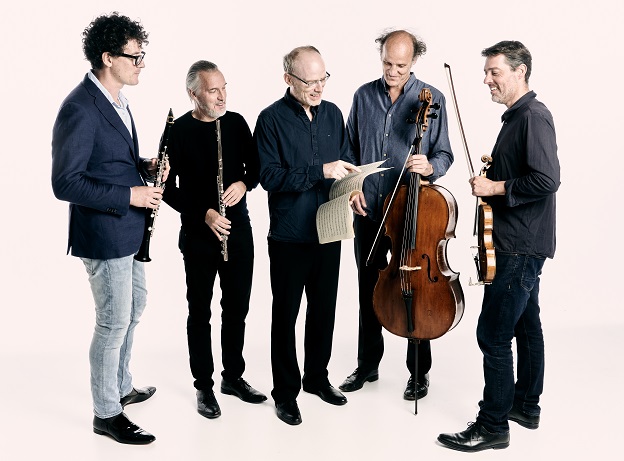Het Collectief has a fixed core of five musicians, Wibert Aerts, violin, Martijn Vink, cello, Julien Hervé, clarinet, Toon Fret, fluteand yourself on the piano. What’s your concern when recruiting musicians for projects requiring more instruments?
When we play our core repertoire within the quintet’s line-up, we want to function like a string quartet. The musicians are never replaced, so we only accept concerts when all five musicians are free. The style of playing is easy to recognize, the group’s identity is clear. When we play in larger projects, we select musicians with the same taste for chamber music, but with an equally strong individuality as the core members. We always ask the same musicians back when a project is repeated, so we built up a similar collaboration as the one inside the quintet. The extra musicians themselves get more experience with the repertoire as well by playing it several times. Of course, we cannot be as rigid with the agendas of the extras as we are with those of the quintet, but we always give it a serious chance.
What’s your preferred sound? What is your ideal?
Of course, the sound of the group changes with the repertoire. The starting point of our repertoire is the music of Vienna just before WWI. The line-up is sounds like a reduced orchestra: woodwinds and strings are connected by piano. Because there’s no viola or oboe, the ideal of this combination is not to make beautiful colors, like in the French quintet, but to create a very clear polyphony. The ideal sound of Het Collectief would be a sound in which every instrument has its own individual expression that communicates with the identities of the other instruments.
 On your new album, you revisit the Quartet for the End of Time, which you recorded back in 2008. Why this return to this work?
On your new album, you revisit the Quartet for the End of Time, which you recorded back in 2008. Why this return to this work?
The piece is one of the most important works in our repertoire. We have been performing it maybe a hundred times. All these experiences have changed our version a lot, and we felt like recording our new visions on this work after fifteen years. Moreover, the first recording is played by the original clarinet player, who left the group more than ten years ago.
You play music from the 20th and 21st centuries. You also have Schumann in your repertoire. Haven’t you ever wanted to play more Romantic music, or even composers from the classical period?
We love romantic music, and I consider the early music of Schönberg to be the most romantic music ever written. So, we are definitely not frustrated because of playing not enough romantic music, on the contrary! The aim of Het Collectief is actually to show the obvious connection between the traditions of nineteenth century music and the modernism of the twentieth century. We don’t like the artificial cut between the so called ‘contemporary music’ and the classical canon. Our position in the concert life is to convince audiences to be more adventurous, and to break the walls between the different (sub)genres. This is why we don’t avoid Brahms and Schumann. By the way: we program Schumann because of a link with Wolfgang Rihm’s ‘Fremde Szenen’ for piano trio, music clearly based on Schumann. We program late Brahms to confront it, or show similarities with early Schönberg…
If, on your 25th birthday, you look back, what are the two or three highlights of your career?
I think the best is yet to come, the group is now profiting from a rare combination of experience with still a very strong will to create special moments on stage. I think we all remember our nine years of collaboration with Reinbert de Leeuw, who has left us in 2020, all the concerts with him made a very strong human and musical impression on us. I also remember the moment our group was rewarded with the first beautiful reviews for our first CD, it made us believe more in this project.
And what is the main change in musical life if you compare your beginnings to what you encounter today?
In my life as a chamber music teacher, that started already before the beginning of Het Collectief, I can say my students today seem to consider Schönberg, Messiaen, Ligeti and even Lachenmann as music from the canon. When we started up Het Collectief, we felt completely alone and a bit lost, because we had to discover most of the music without any help. It makes me happy to see this evolution, and I want to believe Het Collectief has contributed a little bit to this.
Likewise, concert organizers seem to accept the same set of twentieth century composers in their series more easily.
























